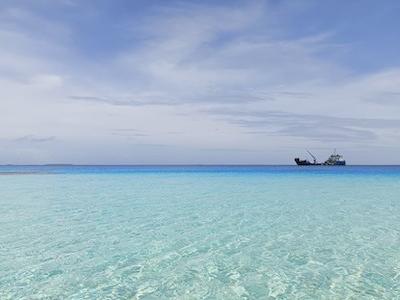Empowering Marshall Islands Atolls: Rainwater Harvesting Materials Reach Atolls

In a groundbreaking initiative, the first lot of Rainwater Harvesting System materials have made their way to Namu, Lib, and Kwajalein Atolls and Islands, signaling a remarkable stride in combatting water scarcity and promoting sustainable water management in the Marshall Islands.
Spearheaded by the United Nations Development Programme (UNDP) Pacific Office in Fiji, through the Addressing Climate Vulnerability in the Water Sector (ACWA) Project, this delivery of Rainwater Harvesting Systems (RWHS) Flatpack Modular Tanks and Plastic Moulded Water Tanks has reached the three northern atolls and islands that face high risks from severe droughts.
This ambitious delivery mission took place over several weeks from 1 to 23 July, traversing these three northern atolls of the Marshall Islands. While logistics played a crucial role in ensuring a smooth process, it was not without its challenges.
Ensuring a seamless transition during the carting process was of utmost importance, and the project's technical team spent two weeks diligently preparing and transporting materials from the ACWA warehouse to Uliga dock in Majuro. Following this, the materials were loaded onto the Marshall Islands Shipping Corporation (MISC) landing craft 'Ribuuk Meto' before embarking on their journey to the targeted northern atolls. Despite facing challenges from the weather and a few technical issues with the craft, the team persevered with the assistance of the ever-smiling and courageous sea-faring community volunteers, who graciously participated in transporting the offloaded materials from shore to the various on-land warehouses.
For this inaugural delivery, the team successfully supplied 40 units of 1500-gallon capacity plastic tanks, 10 units of 8000-gallon flatpack modular tanks, and 39 units of 15,000-gallon flatpack modular tanks, along with 4,770 CMU (Concrete Masonry Unit) Blocks, cement, gutters, downpipes, and rain harvesting fittings. These materials have been distributed to a total of four communities in Namu and Lib, and 11 communities in Kwajalein, including Ebadon and Mejatto. This effort represents a significant step in supporting these communities' water needs and promoting sustainable water management.
Before delivering the materials to the respective communities on the atolls and islands, the ACWA Community Engagement team and Site Coordinator ensured availability of secure warehouses. They also determined the number of volunteers required for transporting the materials from the shoreline to the designated warehouses. Additionally, the ACWA project provided meals, snacks and safety gloves to the volunteers during the transportation process.
The transportation of RWHS materials faced its fair share of challenges and setbacks – with important lessons learnt. Firstly, the weather conditions during the initial leg of the trip proved daunting and tiresome. Upon arrival at the targeted sites, tide/tidal situations posed critical issues, necessitating adjustments to the unloading/off-loading schedule. Additionally, the malfunctioning of the ship’s navigational equipment required sourcing spare parts from Majuro via another vessel.
Despite these hurdles and some team members experiencing sunburns and abrasions from coral cuts, the delivery of the first lot of RWHS materials to Namu, Lib and Kwajalein atolls was undoubtedly a success. The ACWA Project's unwavering efforts to implement rainwater harvesting systems in the RMI atolls will significantly benefit local communities by providing a more reliable and environmentally friendly water source. Rainwater harvesting proves particularly crucial in areas with limited freshwater resources or areas facing contamination risks. By capturing and storing rainwater, these systems alleviate the strain on existing water sources, thereby enhancing water availability for various necessities, including drinking, agriculture, and sanitation.
Ireen Abon, the Site Coordinator for Mejatto Rongelap couldn't contain her excitement upon witnessing the arrival of the RWHS materials for her community in the Kwajalein atoll. She described the delivery mission as “phenomenal” and observed the eagerness of community members to help with offloading the materials from the shoreline to the on-land warehouse.
The strong sense of accomplishment and satisfaction, along with a feeling of community ownership, made the endeavor even more meaningful.
Koji Kumamaru, Project Manager, RMI ACWA Project said, “The significance of community engagement and incorporating local knowledge and needs for ensuring lasting success and sustainability is well understood by the project.
“Through innovative approaches like rainwater harvesting, we are actively addressing water scarcity and making a meaningful contribution to the overall development and well-being of the people in the Marshall Islands. Our collaborative efforts and initiatives are aimed at creating a positive impact on the lives of those we serve," he added.
The ACWA project is funded by Green Climate Fund (GCF) and Government of RMI from 2020 to 2027, to improve household and community rainwater harvesting and storage structures and to increase resilience of water supply in all RMI’s 24 neighboring Atolls and Islands.
Koji Kumamaru, Project Manager, RMI ACWA, Email: koji.kumamaru@undp.org
